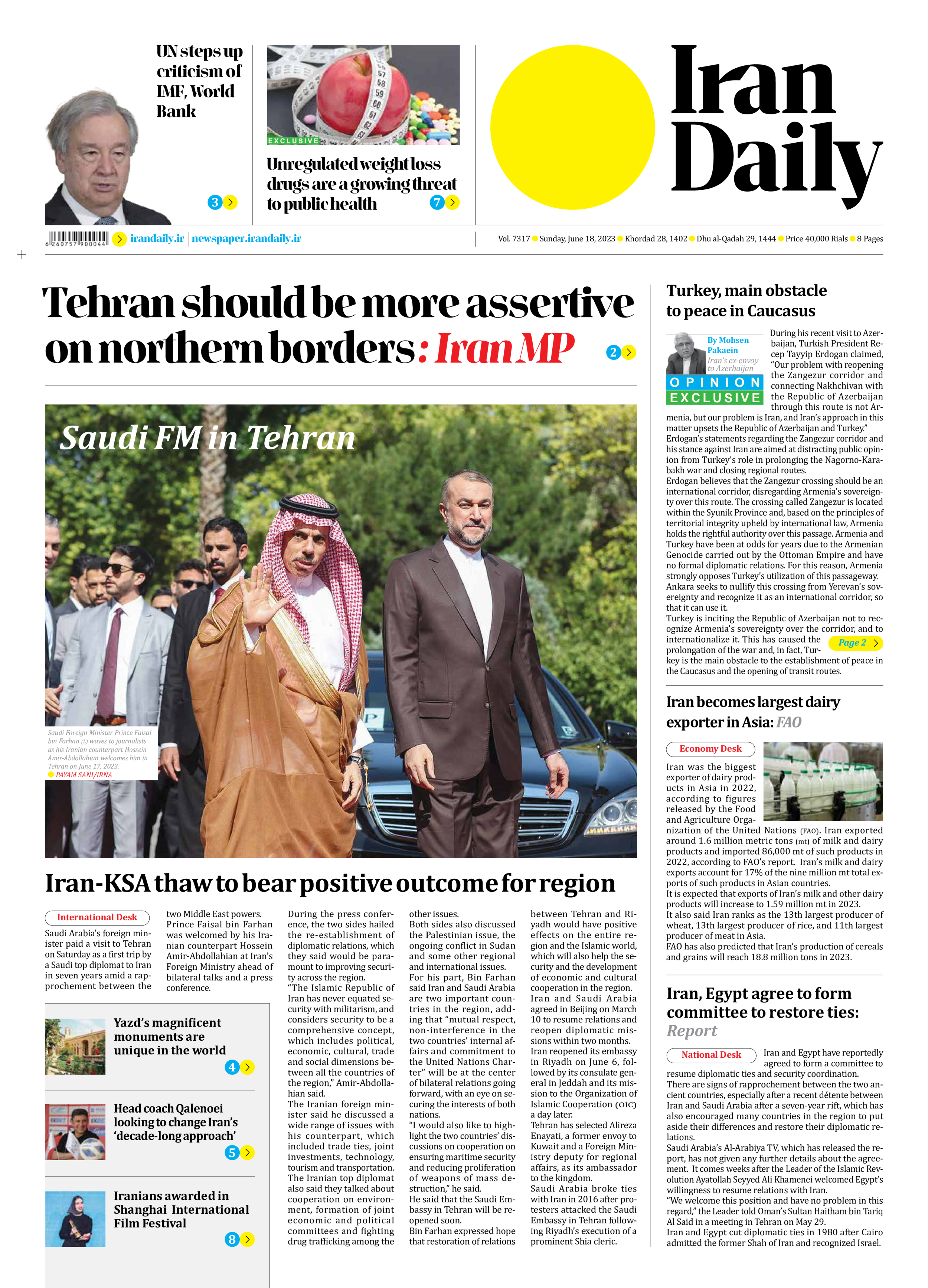
Turkey, main obstacle to peace in Caucasus
By Mohsen Pakaein
Iran’s ex-envoy to Azerbaijan
During his recent visit to Azerbaijan, Turkish President Recep Tayyip Erdogan claimed, “Our problem with reopening the Zangezur corridor and connecting Nakhchivan with the Republic of Azerbaijan through this route is not Armenia, but our problem is Iran, and Iran’s approach in this matter upsets the Republic of Azerbaijan and Turkey.”
Erdogan’s statements regarding the Zangezur corridor and his stance against Iran are aimed at distracting public opinion from Turkey’s role in prolonging the Nagorno-Karabakh war and closing regional routes.
Erdogan believes that the Zangezur crossing should be an international corridor, disregarding Armenia’s sovereignty over this route. The crossing called Zangezur is located within the Syunik Province and, based on the principles of territorial integrity upheld by international law, Armenia holds the rightful authority over this passage. Armenia and Turkey have been at odds for years due to the Armenian Genocide carried out by the Ottoman Empire and have no formal diplomatic relations. For this reason, Armenia strongly opposes Turkey’s utilization of this passageway.
Ankara seeks to nullify this crossing from Yerevan’s sovereignty and recognize it as an international corridor, so that it can use it.
Turkey is inciting the Republic of Azerbaijan not to recognize Armenia’s sovereignty over the corridor, and to internationalize it. This has caused the prolongation of the war and, in fact, Turkey is the main obstacle to the establishment of peace in the Caucasus and the opening of transit routes.
If this crossing is internationalized, Armenia will be stripped of its sovereignty while Russian forces, or multinational armies, will take control of it. This situation means a violation of Armenia’s territorial integrity, which is opposed by Yerevan. Armenia’s position is logical; it is supported not only by Iran, but also by the international community and the UN, because the territorial integrity of the countries should not be violated.
In addition, if Zangezur is removed from Armenia’s territorial integrity, internationally recognized borders will change, and the border between Iran and Armenia will also be closed. This is another reason for Iran’s position regarding the Nagorno-Karabakh conflict and access roads of the Caucasus, which is completely principled and in line with international standards.
Iran welcomes the opening of routes between its neighbors and considers it a path to economic progress for itself and neighboring countries. For this reason, Iran has allowed Azerbaijan to connect to Nakhchivan via the Iranian route for over twenty years. At the same time, Iran respects its neighbors’ territorial integrity, including that of Azerbaijan and Armenia, and opposes any change in internationally recognized borders. That is why Tehran is against the internationalization of the Zangezur passageway, which violates the territorial integrity of Armenia and changes the geographical boundaries.
By maintaining its sovereignty, Armenia is ready to open the Zangezur pass to Azerbaijan, allowing it to enter Nakhchivan, provided that Baku respects its territorial integrity. Obviously, since Armenia does not have relations with Turkey, it does not allow this country to use this passage, and this is Armenia’s right. In this situation, Turkey is abusing its friendly ties with Azerbaijan and is urging President Ilham Aliyev to push for the internationalization of Zangezur, and even threatens Armenia with military action to open the corridor.
In fact, today Ankara is the main obstacle to solving the disputes between Baku and Yerevan, because Turkey will be the main loser in the establishment of peace in the Caucasus. Ankara’s differences with Yerevan are serious and complex, and the process of resolving them will be long.
At the same time, if Turkey opens its borders in the north of Armenia and allows this country to reach Europe through Turkey, Armenia will allow Turkey to use this passage, assuming the resolution of differences between the two countries. Currently, Turkey is against this and has temporarily opened this border just to help Armenian earthquake victims. Armenia is also interested in being able to enter Iran via the Nakhchivan route and connect to Iran’s transport routes if the dispute with Azerbaijan is settled. In any case, the transit routes are the prime issue of the Caucasus and, of course, if Turkey stops its provocations, the disagreements between Armenia and Azerbaijan will be resolved sooner.







